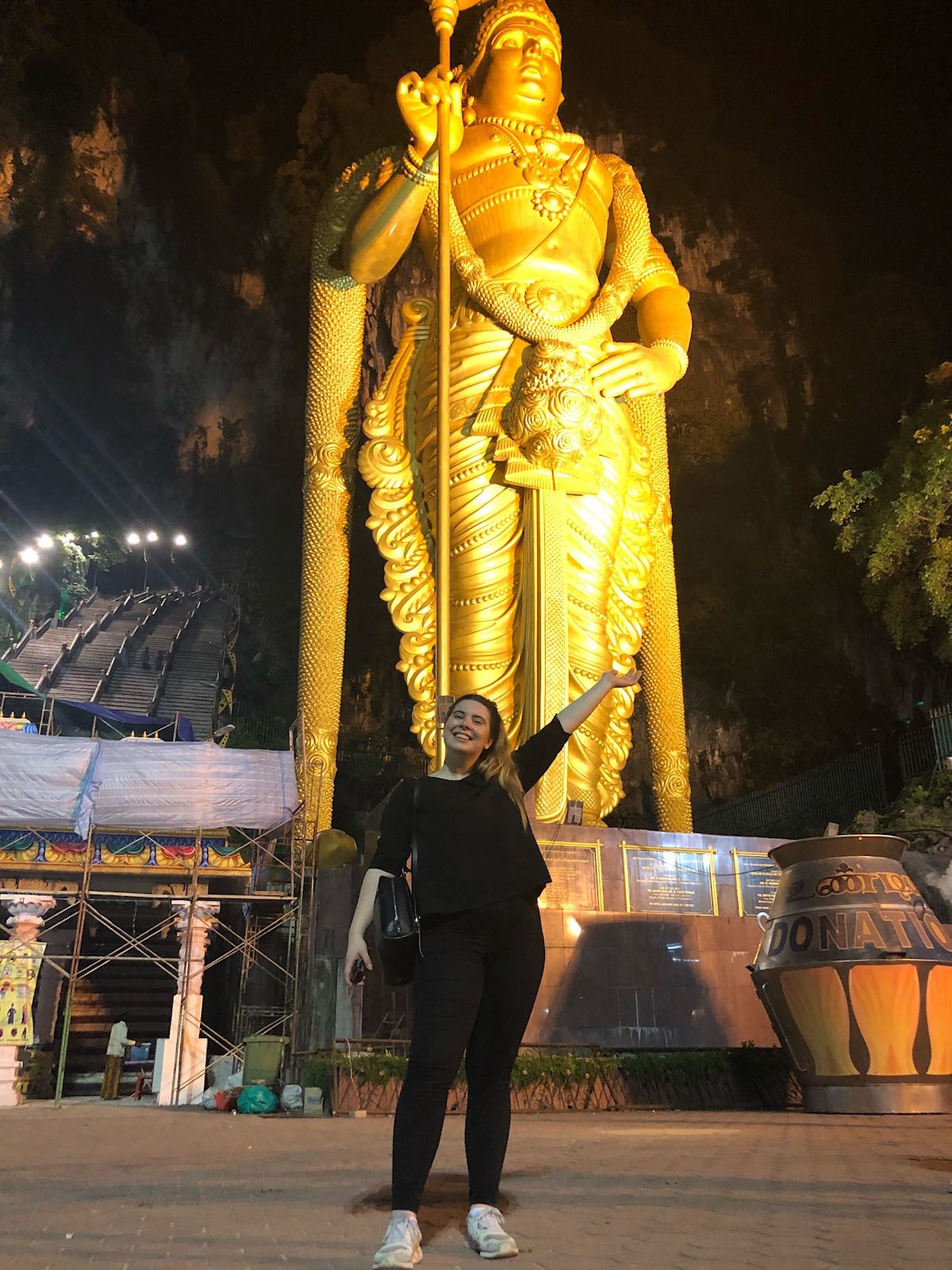Student profile: Justine Tizzard – QChallenge Abroad participant
Justine Tizzard recently took part in the QChallenge Abroad programme in Kuala Lumpur, Malaysia through the Global Opportunities team at Queen Mary. We caught up with her after her trip to find out what she discovered about the city, hear about the people she had the opportunity to meet, and learn which skills she has developed as part of this valuable overseas experience.

Batu Caves in Kuala Lumpur
It’s great to meet you, Justine. Could you start by telling us what you study at Queen Mary?
I’m studying Chemistry and I’m currently in my third year.
How did you first hear about the QChallenge Abroad programme and why did you want to get involved?
I actually heard about the QChallenge Abroad programme through my Malaysian friend at Queen Mary when I was volunteering for the Confucius Institute stand at the Global Opportunities GO Abroad Fair, back in October. I wanted to get involved because it looked like an amazing opportunity and it would give me the chance to improve my leadership skills and visit the city of Kuala Lumpur for free!
The programme saw you explore the global challenge of ‘how to make smart cities more inclusive’. Was there anything interesting that you discovered?
I thought the best way to tackle this challenge of ‘how to make smart cities more inclusive' was to get to know the city and the people living in it as much as possible. I used all of the different types of public and private transportation, as well as all of the three main types of cuisines in the country (Indian, Chinese and Malay). I had the opportunity to meet with and talk to the local students at the University of Malaya, who were incredibly kind and welcoming to their university and country. I asked them many questions to try to find out what life was really like for local people living in Kuala Lumpur.
All of this experience helped me to gain a deeper understanding of the current situation of a city that I have never visited. Kuala Lumpur looks how you’d imagine a futuristic city to look, with massive skyscrapers and lots of tropical trees, but if you look beneath the lavish surface you'll see that not everything is as good as it looks. People often cannot afford to live in the city due to the increasingly high rent prices and salaries that have not changed since the 1970s. The public transportation system is good within the city centre, but if you live in a residential area (which in London would be zone 2 or 3), getting to work can take you as long as two hours. By car this would be a 20-minute ride.
Did you have the opportunity to meet any leaders from global businesses, governments or international not-for-profit organizations?
Yes, I had the opportunity to meet with two very different organisations. The first leaders I met were from myHarapan, an independent not-for-profit based in Malaysia, dedicated towards empowering young Malaysians by supporting youth projects and initiatives that contribute to current nation-building efforts. The second group of leaders that I met were from InvestKL, the government entity set up under the Economic Transformation Programme to attract large global multinationals to establish operational headquarters, or international or regional shared service centres in Greater Kuala Lumpur to strategically grow their business in Asia.
How has this experience helped to develop your skills, and have you learnt anything about yourself during the process?
The programme has helped me to develop my cultural awareness of how Malaysia, in particular Kuala Lumpur, is facing similar problems that have affected it in the past, how the situation is similar to what is happening in London, and also how we could help them with our fresh ideas. I improved my public speaking skills when pitching for my project, which I believe is an indispensable skill in any type of working environment. Furthermore, I learned that being a good leader doesn't necessarily mean telling everyone what to do, but means being observant and listening to others in order to identify their best qualities and use them to the group benefit.
And lastly, I learned about a new concept called cultural intelligence, which is the ability to relate and work effectively across cultures. Without the students of the University of Malaya, I wouldn't have developed this. Any future leader who wants to be successful will require the cultural intelligence to be capable of working with people from a variety of cultural backgrounds.
How do you hope to apply the skills you have developed to your future career?
I hope to apply them next year while doing my masters working in a research team, and I’m sure that the skills I have learned will come in useful in a future leadership role.
Do you have any plans to go abroad in the future or get involved with any of the other opportunities provided by the Global Opportunities team at Queen Mary?
I have a few plans actually. I’m going to be attending the two-week University Immersion Programme in Chengdu, China organised by Sichuan University and the Global Opportunities team at Queen Mary. I have also been awarded a scholarship funded by the UK Government Department for Education to study Mandarin at East China Normal University in Shanghai, China.